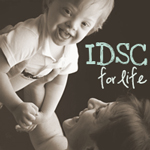We don't totally agree with everything the CMF Protocol uses. Just because we tend to be a bit leery of using drugs at times, especially a drug like Prozac, at this time. But, I think their general concept and idea is VERY good. Which is why we use Ginkgo Biloba. But, we do not use the rest of the protocol.
Changing Minds Foundation holds conference about treatment for Down syndrome
The Changing Minds Foundation (CMF) held its first Conference on July 23-24, in Houston, TX, to discuss available treatments for the different symptoms that affect persons with Down syndrome and to present the research that is currently being carried out in this area.
Various testimonies of families and professionals, who work with those using the Changing Minds protocol, were presented, as well as findings from researchers at Stanford University that investigate drugs to enhance memory and cognition in individuals with Down syndrome by testing them on DS mouse models.
The Changing Minds treatment protocol was established in 2006 by Teresa Cody DDS, the mother of a child with DS. Teresa worked with other mothers around the world via email and they all researched the internet to find an array of scientific studies. The studies using DS mouse models showed improvment in the mice’s ability to learn and remember. The protocol, that uses only FDA approved or over the counter drugs includes B12, Folic Acid, Ginkgo Biloba, Prozac (Fluoxetine), Phosphatidylcholine, Body Bio Balanced Oil and Focalin XR or another ADHD medication(this last one only in cases of attention deficit).
Changing Minds Foundation estimates that around 200 families use the CMF protocol worldwide, or at least part of it, and the large majority of these families have observed great advances in their child’s development with no appreciable side effects. Some of the parents in attendance even related that the use of those medications have changed their child´s life, in many cases providing what they called real miracles. According to presenters, some children have started to follow the protocol as young as 3 months old and have been showing development similar to that of a typical child. Pictures and videos of the treated children were shown to illustrate the improvements.
Joanne Mothes, a teacher with 38 years of experience tutors 30 pupils with Down syndrome in Columbus, Ohio, 14 of them on the CMF protocol. She said that the difference between the students who take the protocol and those who don’t is remarkable. The title of her talk was ‘Draw a Line in the Sand’. According to Joanne, children that use the protocol are more attentive, more verbal, learn faster and remember what they learn. She also said she noticed the good results comparing the students to themselves, before and after starting the CMF protocol.
Research
Scientists from Stanford University Down Syndrome Research Center, H. Craig Heller, PhD, Craig C. Garner, PhD , and Daniel Wetmore, PhD, talked about their research using PTZ (Pentylenetetrazol,) and how that drug would have a similar effect to Ginkgo Biloba, which is currently being used in the CMF protocol. It acts on the GABA receptors of the cell, controlling excitatory and inhibitory inputs, aiming to regulate these two stimuli, that are out of balance in mice and individuals with Down syndrome. As the researchers described, too much inhibition can lead to retardation and even coma, while an excess of excitation can cause hyperactivity to seizures. Drs Heller, Garner and Wetmore all affirmed that this research is advanced , but it will take time and funds for them to reach a safe and approved treatment for persons with Down syndrome. They estimate that some drug will be available on the market in about 10 years time, after the various investigation phases that include FDA approval and clinical trials on people with DS. In their opinion, based on the studies carried out to date, PTZ would be more effective than Ginkgo Biloba.
The Stanford team, as well as other participants of the Conference, stressed the need for families to engage in fund raising as well as putting political pressure in order to implement more research. They also pointed out that it is crucial that the medical community, especially pediatric, psychiatric and neurological physicians be informed and get involved by working with their patients that wish to use the treatments that are already available, like those proposed by the Changing Minds Foundation.
More info: http://www.changingmindsfoundation.org/
http://dsresearch.stanford.edu/
Source: Inclusive

























2 comments:
Q:
really appreciate your honest, upfront feedback in the first sentence.
It is what we've come to expect from you.
Great, too, to see that the mothers are changing the science and participating in it.
Conferences are awesome, most of the time!
Hope to see you guys present in the very near future, at some time or another.
"Why use Prozac when you don't have clinical depression, and many of the off-label uses so poorly documented?"
"And what is the least risky combination which has the most effective results long and short term?"
Gee, it is not about clinical depression. It has a whole lot to do with raising a deficient neurotrasmitter serotonin. Serotonin is the first step in the cascade to grow new neurons. Very IMportant. Serotonin is documented to be low in DS. Lower neuron counts, 50% less than a normal person. Don't focus on the drug name, focus on the awesome effects, new neurons and connections.
Post a Comment